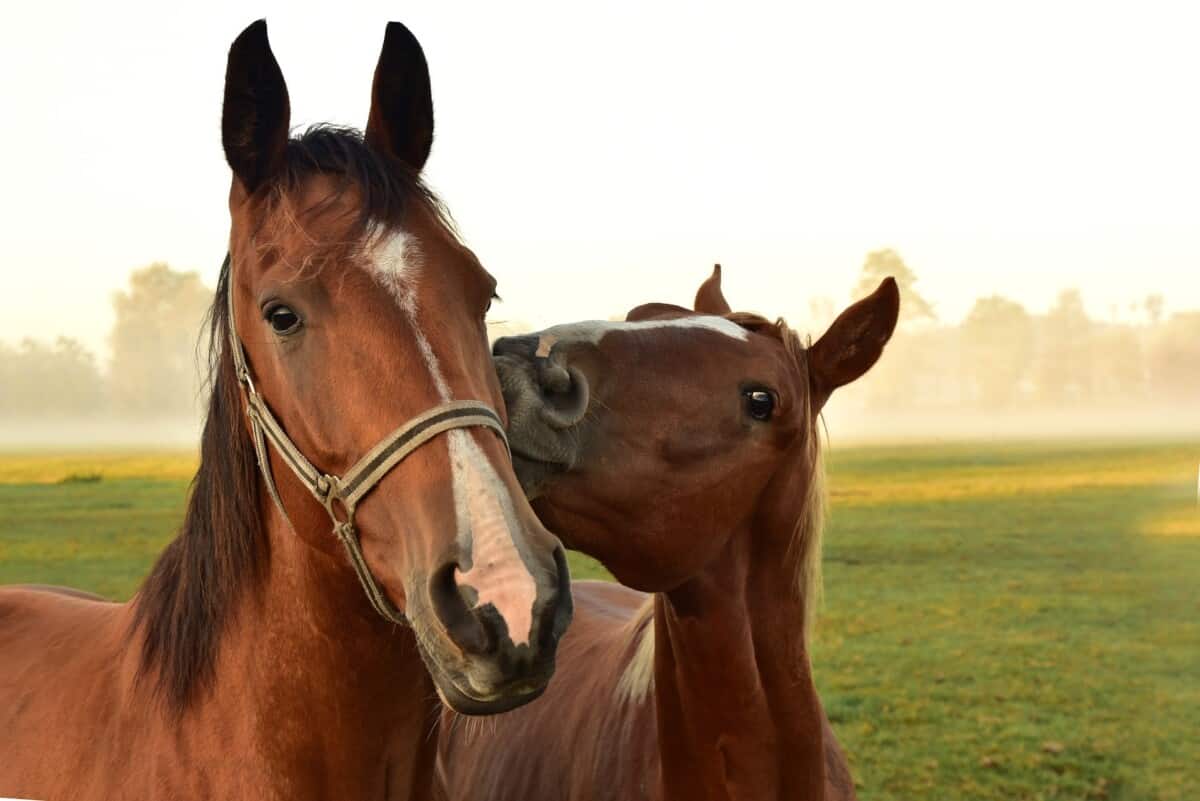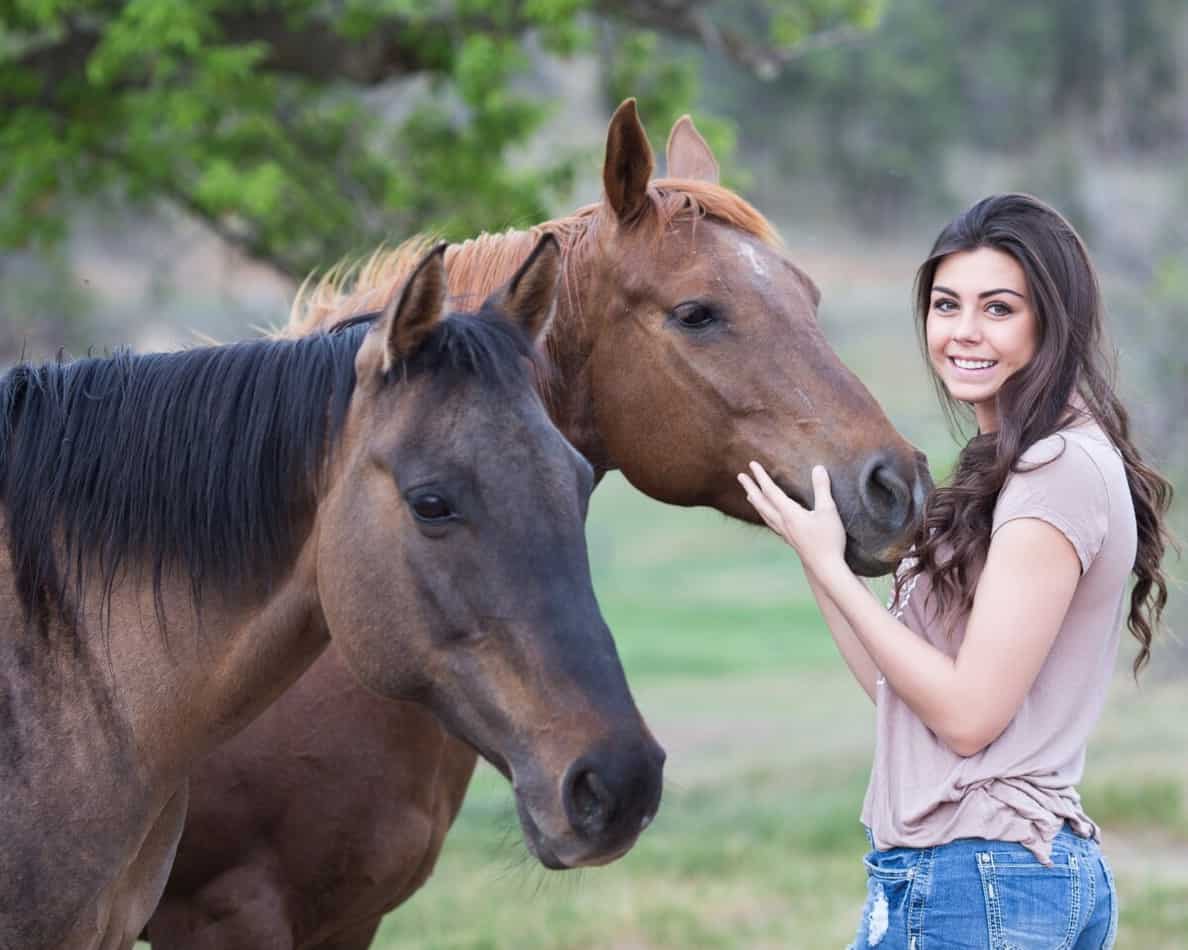Skip To Section
Horses can cost anywhere between £500 and £1500. Horses are expensive animals to buy, and they are more expensive when you consider the associated maintenance costs. So, if you are planning on purchasing a horse, consider if you have the funds to not only buy the horse but maintain it as well.
In the UK, a horse can cost anywhere between £500 (approx. $605) and £15,000 (approx. $1,815). But several factors determine the price of a particular horse – its pedigree, size, breed, and age. For example, a small and young pony would cost a few hundred pounds. A pedigree horse would cost several thousands of pounds.
In the United States, a horse can cost anywhere from five hundred dollars ($500) to five thousand dollars ($5000). Some horses even can cost anywhere between ten thousand dollars ($10,000) and twenty thousand dollars ($20,000).
The purchase price depends on the horse. Below we have listed all the factors that determine the overall price of a horse.
Some Other Factors That Affect The Price Of A Horse
Besides the horse’s breed, pedigree, size, and age, some factors might affect the selling price of a horse:
- Trained horses cost more than horses than come with little or no training.
- Horses that suffer from health issues cost less than healthy horses.
- If a horse has behavioural issues, you can buy him for less than he is worth.
- Horses that are sold by top stud farms for the use in high-level competitions cost far more as they are often imported from other parts of the world and have impressive bloodlines.
- The state of the economy can affect the cost of a horse. Not many people will buy a horse when there is a slump in the marketplace, and prices go down at this time.
- During an economic slowdown, people cannot afford to maintain their horses and sell them cheaply.
- Poor hay crops, the rising cost of feed and fuel costs can affect the number of horses sold, and the asking price of those horses.
Costs That Arise Even Before You Buy A Horse
When you plan on buying a horse, your expenses begin even before you purchase the animal.
1. Legal Costs
Hire a solicitor to draw up a legal agreement, especially if you are going to be buying an expensive horse. The agreement must set out the terms of the sale. It would also act as evidence if any dispute arose regarding the ownership of the animal.
A solicitor’s fee of approx. £100 ($121) can be added to the cost of the horse.
2. Vetting The Horse
When you decide to buy a particular horse, you must ensure it is thoroughly vetted to make sure it is healthy and fit. There are two types of vetting – a two-stage vetting process and a five-stage vetting process. The five-stage vetting process is much more expensive but more thorough, rigorous, and provides a lot of information about the horse that a two-step vetting process cannot offer.
Some insurers insist that the animal undergoes a five-step vetting process.
Vetting costs can be anywhere between £75 and £250 ($90 to $300).

Are Horses Expensive?
Buying a horse is a significant investment – it might not cost you as much as it would cost to buy a property, but it is a considerable investment, nonetheless. Horses need daily maintenance, and this maintenance is not free. You will run up expenses every day, every week, every month, and every year. On average, you will spend £10,000 ($12,100) annually on your horse.
Why Are Horses So Expensive?
Unlike buying an inanimate property, a horse is a living being that needs continuous maintenance. So, when considering purchasing a horse, you must also consider the costs associated with maintaining your horse through its lifetime. Many people in the UK buy horses but are unable to maintain their upkeep. Sadly, these neglected horses are simply abandoned eventually.
Horses are expensive because they require a lot of maintenance. Their food alone costs money, plus there are costs associated with health, shelter, and general upkeep. All these costs add up and make horses expensive animals.
How Much Does It Cost To Maintain A Horse? (Costs Of Horse Ownership)
When you buy a horse, you will spend a lot of money every year in maintaining your horse. Here are some costs to consider when purchasing a horse.
Livery
Farmers rent out their fields to horse owners for their horses to graze in. Most fields have few facilities for horses, and you might need to take responsibility for the upkeep of the field, so your horse is healthy. Some horse owners choose to keep their horses in livery yards that are equipped with a variety of facilities like schooling arenas, jumps, and tack rooms.
Find out more information on the different types of boarding options including the factors that determine the overall cost to board your horse. Read our definitive boarding guide here.
If your horse is in a stable, then you will have to purchase hay for the entire year, as well as the required bedding. There are different types of bedding available, and each type has its advantages and is priced differently. Every kind of livery offers different kinds of facilities and are priced accordingly. The different types of livery available in the UK are:
- Grass livery – costs between £20 and £25 ($24 and $30) per week.
- DIY stabled livery – costs between £30 and £40 ($30 and $50) per week.
- Full livery – costs between £100 to £150 ($120 and $180) per week.
Feed
You will have to feed your horse every day. There are different types of horse feeds, and the type of horse feed you choose will depend on:
- The size of your horse
- Whether it is stabled or on grass
- How much exercise it needs.
Hay is a good option. You will need to feed your horse some hay every day. Hay is available in bales and costs around £45 ($55) each.
Horses have a very delicate stomach that is sensitive to change. Ensure you select the correct feed for your horse.
Supplements
Your horse might need horse supplements like vitamins and minerals that are quite costly. If your horse is young on a proper diet, then horse supplements might not be required. But as your horse gets older or develops health issues, supplements will be necessary.
Veterinary Check-Ups
Annual vaccinations are a must against Tetanus and flue. As well as the vaccinations, your horse will require regular check-ups to ensure it is healthy. Any additional medical problems will require extra trips to the vet, and that naturally means more expenses like the vet’s fees and medication.
Insurance
Horse insurance or equestrian insurance covers a wide range of liabilities like death, theft, and legal liability. You need some sort of insurance at all times, just in case someone decides to sue you for damage or injury caused by your horse.
Your horse will also need health insurance.
Farrier And Dentist
Your horse will need a farrier to visit every six weeks whether or not your horse is shod. As well as that, your horse needs annual dentist check-ups to ensure its teeth are in order- that there are no sharp edges on its teeth that might be causing it discomfort (a common problem with horses).
Riding Gear, Grooming Supplies, And Equipment
If you are riding your horse, besides grooming supplies, consider the costs of the riding gear and equipment – This includes a saddle, bridles, blankets or pads.
Some sellers might include the horse’s existing tack and equipment, and grooming supplies in the deal. If these are not included, you will need to buy these. You can buy a second-hand saddle for around £200 (approx. $242) and a bridle for an additional cost of £20 (approx. $24). If you want to buy a new tack, then you will pay almost triple the amount.
Budget in two turnout rugs per year. A turnout rugs costs around £50 (approx. $60). If that too expensive you might consider a cheaper alternative stable rug which is about £30 (approx. $36) apiece.
Other items include:
- Feed bucket
- Grooming kits
- Other bits and pieces
All of that will work out to an additional cost of £200.
Then there is the rider’s equipment to be considered as well – right from the helmet down to the breeches.
Worming
Horses are prone to developing worm infestations that can cause serious health problems. Your horse will need regular deworming.
The Average Annual (Per Year) Cost Of Owning A Horse In The UK
| Item | Horse/pony on grass livery | Horse/pony on DIY stabled livery | Horse/pony on full livery |
| Livery | £1,040 to £1,300 (approx. $1,260 to $1,575) | £1,560 to £2,080 (approx. $1,888 to $2,518) | £5,200 to £7,800 (approx. $6,296 to $9,444) |
| Hay/straw/shavings | £140 to £220 (approx. $170 to $266) | £1,040 to £1,560 (approx. $1,260 to $1,889) | Usually included in the livery fee |
| Feed | £120 to £240 (approx. $145 to $291) | £260 to £520 (approx. $315 to $630) | Usually included in the livery fee |
| Vet’s fees | £70 (approx. $85) | £70 | £70 |
| Insurance | £240 to £480 (approx. $291 to $581) | £240 to £480 | £240 to £480 |
| Farmer | £225 to £765 (approx. $272 to $926) | £225 to £765 | £225 to £765 |
| Dentist | £50 to £70 (approx. $61 to $85) | £50 to £70 | £50 to £70 |
| Farrier | £225 to £765 (approx. $272 to $926) | £225 to £765 | £225 to £765 |
| Worming | £40 to £105 (approx. $48 to $127) | £40 to £105 | £40 to £105 |
| Extras (hidden costs) | £1000 (approx. $1211) | £1000 | £1000 |
| Total | £2,925 to £3,630 (approx. $3,542 to $4,395) | £4,485 to £6,660 (approx. $5,430 to $8,064) | £6,685 to £10,300 (approx.8,094 to $12,471) |
How To Lessen Maintenance Costs
The best thing you can do to lower the maintenance costs of your horse is to provide your horse with all the basic necessities and look after it well regularly. Owning a horse can be an enriching experience, but there are responsibilities that you have toward your horse. Here are some things you can do to avoid costs associated with sickness and deteriorating health.
Basic Care
Feed: Ensure your horse has access to an adequate amount of good quality feed to keep their body in good condition.
Water: Horses drink as much as 45 litres of water on hot days and over 25 litres of water in cold weather. Ensure your horse has access to clean water at all times. A self-filling trough is a good choice. If you use a bathtub, then it must be checked daily and refilled when necessary.
Shelter: Your horse needs refuge from the heat, cold, and rain.
Exercise: Horses require a lot of activity. They need a lot of space to walk and run around unless they are exercised on a regular (daily) basis.
Paddocks: Fences must be in good condition to prevent your horse from getting injured or escaping.
General Health Care
Feet: Ensure you get a farrier to trim your horse’s hooves every 6 to 8 weeks. Your horse will not need shoes unless you plan to ride your horse.
Teeth: Get your horse’s dentist to look at its teeth once a year. Horse teeth problems can cause severe injuries and excruciating pain.
Worming: Your horse is prone to work infestations and needs frequent and regular worming treatment. Some treatments are required to be administered every six to eight weeks.
Vaccination: Ensure your horse’s vaccinations are always up-to-date to prevent serious diseases like tetanus, strangle, and viral respiratory illness.
Regular monitoring of body condition: Ensure your horse does not get too thin or too fat. If you can see your horse’s ribs, then it is too thin and needs more feed and might needs supplements as well.

How Do You Buy A Horse?
Now that you know about the costs associated with buying and maintaining your horse, you can go ahead and buy a horse if you can afford to buy and maintain one. There is nothing more thrilling for a horse lover than the buying and arriving of their first horse. Here’s how you can choose a horse for yourself.
1. Pick a horse that is the right weight. The horse you choose should be at least times your weight – if you will be riding it. The rule is that a horse can comfortably carry 20% of its body weight and no more than that.
2. Pick a type of horse that is the right height. Your feet should not dangle below the horse’s belly when you sit on it. Ponies are an excellent option for young children and petite adults. Czechoslovakian Small Riding Ponies are great for children, while Icelandic horses are excellent for adults.
You won’t be able to judge if a horse is a right size unless you sit on it. Make sure you ride the horse before you buy it.
3. Choose the right horse breed. There are several hundreds of breeds of ponies and horses today, but not all of them are the right choice. Each breed has its advantages and disadvantages, and some breeds are better than others. You must conduct a lot of research on the different types of breeds available for sale – their pros and cons.
4. Choose a type of horse that suits your personality. Horses have their own personality, and horses of a particular breed will often exhibit the same type of temperament and personality. While some breeds have calm personalities, other breeds are energetic. Because their personalities can be so different, you must ensure that your horse’s personality matches your personality.
It can be challenging to tell a horse’s personality from seeing it just a couple of times, so ask the seller about its temperament before you buy it. If you can’t get information on its personality, ask if you can have the horse for a trial period before you make a decision.
4. Choose a horse that matches your experience level. There is a saying that you should never match a green horse with a green rider. A new rider must always start with a horse that has decent experience. A new rider will need time to master the necessary riding skills. Matching a green horse with a green rider can result in picking up wrong riding skills and habits for both the horse and the rider.
Mention your level of riding skills to the seller and ask for a horse that is suited to your level of experience.
5. Choose a horse that meets your riding goals. Think about your long-term riding goals. If your goal is to compete in equine competitions or other equine sports, then you need a horse that is in its prime and with several years of intense riding ahead of them. The horse’s physique must be suitable for the physical demands placed on it.
If, on the other hand, you plan to do a lot of trail riding and pleasure riding, then you don’t need a horse built for competitions. However, you must look for a reliable, level-headed horse with a good temperament and lots of endurance to carry you and your gear over a long distance.
Conclusion
Buying a horse is not as simple as picking up a good-looking horse. Nor is it about having enough money to purchase a horse but without enough for its proper maintenance. Buying a horse is a huge decision. You are taking over the care of a living creating. Ensure that you will be able to look after the horse well right up until the very end. Finally, when you are buying a horse, always take someone who has experience in buying horses with you.
Sources
- https://www.horsemart.co.uk/community/article/general-equine/horse-prices-how-much-does-a-horse-cost-
- https://equine-world.co.uk/info/buying-loaning-selling-horses/buying-a-horse/considerations-prior-to-buying-a-horse/cost-of-owning-a-horse
- https://www.moneysupermarket.com/pet-insurance/cost-of-a-horse/
- https://www.thesprucepets.com/how-much-do-horses-cost-1886151
- http://agriculture.vic.gov.au/agriculture/livestock/horses/basic-horse-care
- https://www.horseandrideruk.com/expert-advice/articles/the-real-cost-of-a-horse

